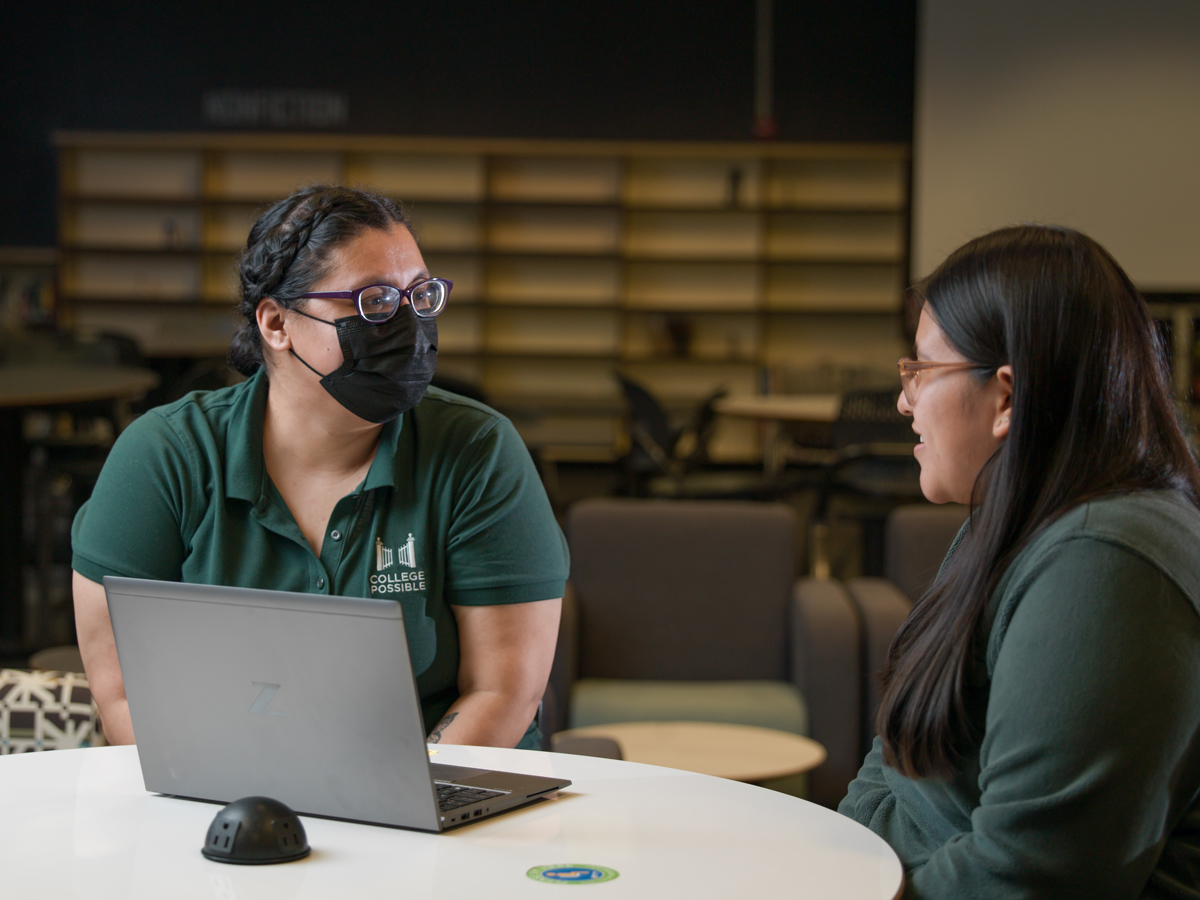A Q&A with Ashley Mansfield, Student Success Coordinator and College Possible Program Lead and Gabriela Nuño, Director of the Academic Success Center and Program Champion.
On each campus where College Possible coaches serve, they are equipped with a campus Program Lead and a Program Champion. Program Leads provide supervision, training and support to College Possible coaches and ensure effective delivery of the program to students. Program Champions manage the relationship with College Possible and serve as primary advocate for the partnership within the institution. Both play major roles in our effective near-peer coaching model to provide support and resources for coaches to best serve their students.
Q: What is your position at CSU Stanislaus, and how long have you been working in higher education?
Nuño: I am the Director of the Academic Success Center, which includes General Advising, Educational Opportunity Program, Promise Scholars, and Transfer Student Services. July marks 15 years working in higher ed.
Mansfield: I am the Student Success Coordinator for the Stockton Campus- I work with a majority of the Transfer Students and of course, the College Possible cohorts. I have been working in higher ed since I was in my grad program in 2015- yikes! So, 6 years. I have loved every minute of it.
Q: What has your experience been like as a College Possible Program Lead/ Program Coordinator? Is there one specific thing you would recommend to others thinking about implementing programs like this?
Mansfield: My experience with College Possible has been nothing short of amazing. I have been able to partner not only with AmeriCorps members, but become more engaged with the Stockton community and Stockton Scholars. What I would recommend to others thinking about implementing programs like this on their campus- do it. Try it out; this model of near-peer coaching has really brought something special to our campus.
Nuño: It has been a wonderful experience partnering with College Possible and Stockton Scholars (a community organization in our service area) to implement the near-peer coaching program. Because of this, my recommendation would be if you are able to partner with a community/school organization it provides a unique insight into the needs and assets of your community and students.
Q: How have you partnered and/or collaborated with College Possible in training coaches on supporting first-generation students?
Nuño: I have found that the training provided by College Possible provides a strong foundation for our coaches. What we have done at the campus level is provide campus-specific training on our programs, services and affinity groups that speak to the intersectional identities of our first-generation students.
Mansfield: Besides checking-in at the monthly program lead community practice meetings and learning what other campus leads may do; I always aim to have the coaches collaborate with other campus resources. Together we complete training from different departments and learn ways we can holistically serve all of our students. For example, last year the coaches were certified in Youth and Mental Health First Aid- in addition to participating in the Undocu-Ally Training
Q: What new initiatives is CSU, Stanislaus trying to help support first-generation students? What kind of impact has the pandemic had on these or other initiatives?
Nuño: What is unique about Stanislaus State is our large first-generation student population, about 75% of our undergraduate students identify as first-generation. So, we are focusing on high-touch services that help build community. For example, for the fall 2021 we are matching every first-time freshman with a peer mentor by partnering with existing and new support programs. The pandemic has actually fueled our efforts to be bold and work together across campus to create a coordinated network of support.
Mansfield: Stanislaus is constantly creating and implementing new policies around first-gen students. What is really cool about Stan State, is that a majority of our undergrad students identify as first-gen- if anything the pandemic did not hinder these initiatives, but rather fueled the fire even more to make sure we are serving all of our students holistically and really fostering these high-touch services.
Please feel free to share any examples of the impact that the work you’ve done with College Possible has made.
Mansfield: I think having students attend events that the coaches host, virtual (or when we were in person), really attest to the work that they are doing. Having students feel supported and comfortable enough to show up to registration workshops, or even pop-in to virtual walk-in hours, really shows that their services are making a difference.
Nuño: We entered this partnership to help students through graduation, and we are seeing indicators of success. In our first cohort, 2019-2020, retention rates to the following year were on par with the overall student population. In addition, after spring 2020 – during the pandemic – the College Possible cohort’s term GPA was higher than the GPA for all students. My favorite example of impact is how one of the mentees from year 1 became a coach upon graduation, this speaks to the impact coaches are making on the student experience. As we prepare for year 3, we also have three out of four coaches returning (the fourth already served two years), which speaks to the value and rich experience of being a coach.



